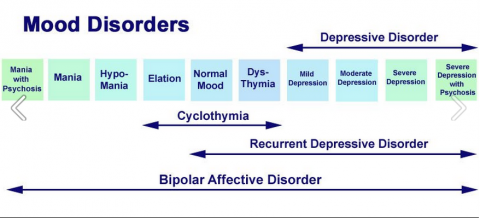
Bipolar Disorder

Bipolar disorder, also known as manic-depressive illness, is a brain disorder that causes unusual shifts in a person’s mood, energy, and ability to function. Different from the normal ups and downs that everyone goes through, the symptoms of bipolar disorder are severe. They can result in damaged relationships, poor job or school performance, and even suicide. But there is good news: bipolar disorder can be treated, and people with this illness can lead full and productive lives.
Signs and symptoms of mania (or a manic episode) include:
- Increased energy, activity, and restlessness
- Excessively “high,” overly good, euphoric mood
- Extreme irritability
- Racing thoughts and talking very fast, jumping from one idea to another
- Distractibility, can’t concentrate well
- Little sleep needed
- Unrealistic beliefs in one’s abilities and powers
- Poor judgment
- Spending sprees
- A lasting period of behavior that is different from usual
- Increased sexual drive
- Abuse of drugs, particularly cocaine, alcohol, and sleeping medications
- Provocative, intrusive, or aggressive behavior
- Denial that anything is wrong
Signs and symptoms of depression (or a depressive episode) include:
- Lasting sad, anxious, or empty mood
- Feelings of hopelessness or pessimism
- Feelings of guilt, worthlessness, or helplessness
- Loss of interest or pleasure in activities once enjoyed, including sex
- Decreased energy, a feeling of fatigue or of being “slowed down”
- Difficulty concentrating, remembering, making decisions
- Restlessness or irritability
- Sleeping too much, or can’t sleep
- Change in appetite and/or unintended weight loss or gain
- Chronic pain or other persistent bodily symptoms that are not caused by physical illness or injury
- Thoughts of death or suicide, or suicide attempts